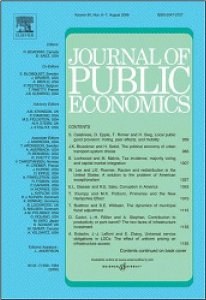
Brandts, J., Riedl, A. and van Winden, F. (2009). Competitive rivalry, social disposition, and subjective well-being: an experiment Journal of Public Economics, 93(11-12):1158--1167.
-
Affiliated authorFrans van Winden
-
Publication year2009
-
JournalJournal of Public Economics
This paper experimentally studies the effects of competitive rivalry in a social dilemma where people's actions cannot be contractually fixed. We find that, in comparison with no rivalry, the presence of rivalry does neither increase efficiency nor does it yield any gains in earnings for the short side of the exchange relation. Moreover, rivalry has a clearly negative impact on the disposition towards others and on the experienced well-being of those on the long side. Since subjective well-being improves only for those on the short side rivalry contributes to larger inequalities in experienced well-being. All in all rivalry does not show up as a positive force in our environment.